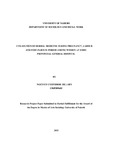| dc.description.abstract | According to World Health Organization (WHO), a vast majority of people in
Africa and Asia rely on herbal medicine for their primary health care needs. The
concomitant use of traditional and biomedical systems of care is common in both
rural and urban areas in Africa. Use of herbal medicine and traditional systems of
care by expectant mothers as well as lack of disclosure to healthcare practitioner
has an influence on both health-seeking behavior and outcomes of care.
The broad objective of this study was to assess the utilization of herbal medicine
among women in Embu Provincial General Hospital .The specific objectives of
the study were: a) to determine the prevalence of use of herbal medicine in the
study group, b) to determine the socio-demographic factors associated with herbal
medicine use in the study group, and c) assess health-seeking behaviour,
disclosure to healthcare practitioner and perception of safety and efficacy among
users and non-users. It was a cross-sectional survey of 165 randomly selected
women. Data was collected using a semi-structured questionnaire administered by
an interviewer or self-administered in presence of interviewer. Quantitative data
was entered into SPSS version 16.0 and analyzed descriptively (means and
frequencies). Chi-square test was used to compare differences between categorical
variables at 0.05significance level. Multiple logistic regression models were used
to analyze for joint effect of more than one independent variable. The prevalence
of herbal medicines use during pregnancy, labour and post-partum period among
women attending antenatal clinic at Embu Provincial General Hospital (PGH) was
high (70%).Age, distance to the nearest health facility, employment status and
number of children were found to be significantly associated with use of herbal
medicine. The use of herbal supplements in pregnancy is likely to be relatively
high in pregnant Kenyan women and it is important to ascertain which
supplements (if any) women are taking. Pregnancy care providers should be aware
of the common herbal supplements used by women and of the evidence regarding
potential benefits or harm. It is essential that health care personnel teach their
patients about possible interactions between herbs and prescription or over-the counter medication | en |

